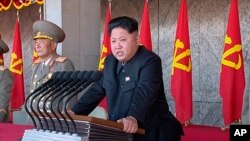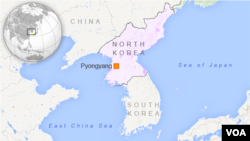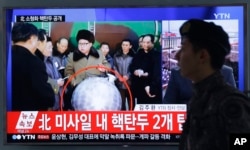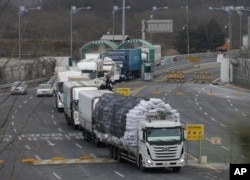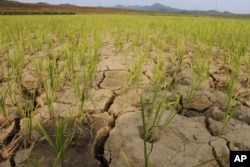North Korean leader Kim Jong Un’s grip on power is now "unshakable" following the country’s recent nuclear test and rocket launch, a South Korean official said Tuesday.
Despite purges of numerous high-ranking officials, including the execution of Kim’s uncle and mentor, Jang Song Thaek in 2013, and last year’s removal of the country’s defense minister, Hyon Yong Chol, there are no indications of growing instability in the North Korean leadership, the official said, speaking on condition of anonymity.
And the tougher international sanctions that were recently imposed have actually seemed to strengthen the North Korean leader’s authority and power.
The new United Nations measures adopted last month are meant to cut off sources of funding and supplies to North Korea’s nuclear and ballistic missile programs.
Sanctions enforced
China on Tuesday moved to enforce the sanctions by banning imports of gold and rare earth minerals from North Korea and exports to the country of jet fuel and other oil products used to make rocket fuel.
Kim seems now “in a hurry” to advance his country’s nuclear capabilities before the full effects of the sanctions take hold, said the South Korean official.
Last month, Kim said his country had miniaturized nuclear warheads to mount on ballistic missiles although this claim has not been independently verified.
Warhead, missile
The South Korean official said Seoul believes North Korea has developed a one-ton (907 kg) warhead that can fit on a Rodong missile that can reach a distance of 2,000 kilometers and potentially strike U.S. bases in Okinawa and Guam.
But he said Pyongyang is still a couple years away from developing the capacity to strike the U.S. mainland.
By moving quickly to increase its technical capabilities North Korea reportedly hopes to solidify its status as a nuclear power in the eyes of the world.
South Korea's defense ministry this week rejected Pyongyang’s call for talks to resolve the standoff over the North’s nuclear program.
Seoul is “not interested in dialogue for dialogue’s sake,” and time is needed for the sanctions to force Pyongyang to “change its behavior” and agree to give up its nuclear ambitions, the South Korean official said.
Kim is expected to demand continued nuclear development. But if the sanctions restrict needed funding, materials and equipment, North Korean officials will be unable to meet their goals. And that, the South Korean official said, will “introduce an element of chaos” within the highly secretive and repressive regime.
Possible humanitarian crisis
Any further nuclear or ballistic missile tests will be met with additional sanctions that could include a ban on the export of North Korean labor.
The Database Center for North Korean Human Rights (NKDB) estimates there are more than 50,000 North Korean laborers working in China, Russia and other countries, and that they earn billions of dollars, most of which goes to the state.
There is concern that North Korean sanctions could have a severe impact on much of the general population, which already lives on the margins of poverty.
South Korean President Park Geun-hye’s decision in February to close the jointly run Kaesong Industrial Complex put more than 54,000 North Korean employees out of work.
North Korean state media last week warned that the sanctions could cause another “arduous march,” a term that refers to the severe North Korean famine that killed more than 3 million people in the 1990s, and the hardships suffered after the Soviet Union collapsed and stopped sending economic aid, and because the communist government grossly mismanaged the country’s economy.
Aid suspended
Most South Korean aid to the impoverished North has been suspended in light of the recent provocations and sanctions.
Little is known about these privately funded assistance programs because North Korea set conditions for accepting aid that include an agreement not to disclose what aid was sent, and not to acknowledge that a request was made.
The Seoul official said North Korea bears the responsibility for any humanitarian needs that arise due to the sanctions, and that it would be “wrong to criticize South Korea” for supporting measures that restrict the North’s economic activities.
While the sanctions target economic activities that fund North Korea’s nuclear program, they could also aid in the growth of private markets that will more directly benefit ordinary people.
Since the famine of the 1990s North Korean authorities have allowed the growth of the private economy to increasingly provide for the needs of the people.
North Korean leader Kim has embraced economic reforms that include allowing farmers to sell a portion of their crops, and provides some industries more incentives and control to manage their production and workforce.




